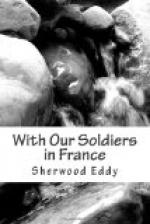Beside this photograph is the card of a strong-willed, self-righteous young Pharisee, who had no use for religion in peace time, but who was driven to God by his awful conflict with sin in this war. Next comes the card of a young man who formerly had lived a proper conventional life without bad habits. The war taught him to drink and he finally became a drunkard, but in his extremity he found Christ as a personal Saviour. Next comes the card of a man who had been in a public house for thirty-two years—twenty-seven years as a bar tender and five years as a saloon keeper. He said, “I have sent men to hell with drink. I have seen women who would sell the clothes off the backs of their children or pawn their husband’s clothing to get drink.” Yet this man has been brought to God during the war. Many a man has found God on the field of battle, or like the thief has turned to him in the hour of death.[2]
[Illustration: Three Thousand Soldiers in the Crowboro Hut.]
One young soldier thus describes his experience which is typical of many another: There had been a charge, a hopeless affair from the start. He lay in the long grass between the lines, unable to move, and with an unceasing throbbing pain in his left leg and arm. A whizz-bang had caught him in both places. He just lay there, feeling strangely peaceful. Above him he could see the stars. All this bloodshed—what was the good of it? He suddenly felt terribly small and lonely, and he was so very, very weak. “God!” he whispered softly. “God everywhere!” Then into his tired brain came a new phrase—“Underneath are the everlasting arms.” He sighed contentedly, as a tired child. They fetched him in at last. He will never again be sound of limb; but there is in his memory and in his heart that which may make him a staunch fighter in other fields. He has learned a new way of prayer, and the courage that is born of faith well-founded.
The idea has been widely preached by many British chaplains that death in battle saves. This may be good Mohammedanism, but it is surely not the Christian message that is given to Christ’s ministers to preach. The verse most often quoted in support of this theory is: “Greater love hath no man than this, that a man lay down his life for his friends.” But such a passage cannot be taken out of its context either in Christ’s teaching or in the man’s own life. Our Lord had said that we were to love even as He loved, that is, out of a pure and surrendered heart to lay down our life for our friends; and He added, “Ye are my friends if ye do the things which I command you.” It is going far beyond the province of the Christian minister to offer any hope other than that which is offered by our Lord Himself. It is not death or a bullet or battle that saves. Christ only saves, and there is no other name given under heaven. This offer is made to all men and at all times.
But although one may not preach so dangerous and misleading a doctrine, it is nevertheless possible to realize that many a man is unconsciously more of a Christian than he knows, and that in the last day he may say with surprise: “When saw I Thee an hungered and fed Thee?”




